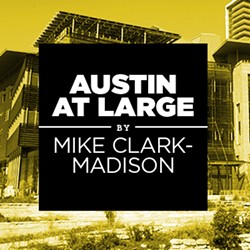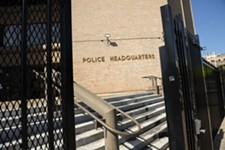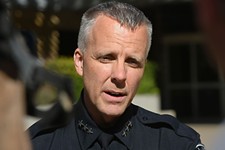Austin @ Large: Meet and Obscure
The new police contract is neither the cause nor cure of APD's crisis
By Mike Clark-Madison, Fri., March 26, 2004

To be sure, busting a band on Sixth Street during South by Southwest, even in what both witnesses and videotape suggest was an unnecessarily ham-handed way, is a trivial matter compared to the taking of a life, or even to other controversial recent actions of Austin police. But for a city government, police department, and police union that are all striving to cool off, calm down, and put the last two years' worth of strife behind them, the timing of the latest incident – one that, given its context, effectively unites constituencies heretofore at odds over the APD crisis – could not be much more inopportune.
The City Council may have no choice but to approve the meet-and-confer contract, but many citizens, and perhaps some council members, will be looking (or are still looking) for signs that someone at City Hall has really heard the community's frustration with APD, whether that frustration is fair, or not, or (as is likely) somewhere in between. This is a heavy burden to attach to a meet-and-confer process that's not designed to address the things that the citizens are really angry about, but one suspects that if APD's community relations were happier – as they were back when the expiring contract was adopted – this deal really could have passed the council by consent two weeks ago, as originally planned.
Shell Games
Certainly, there's a relationship between what officers are paid, or how their experience and education are rewarded, or what happens to them when accused of misconduct, and what officers actually do on the streets of Austin. But that relationship is a lot less direct than some would prefer. Many changes that need to be made at APD and City Hall (and beyond) to respond to the controversies of the last two years could be made under the expiring contract, under the new contract, or without a meet-and-confer deal at all. They are changes to APD management practice, to the training and supervision given to officers, to city funding priorities in areas beyond officer compensation, and to city ordinances themselves.
Note, for example, how quickly the noise ordinance – the product of months of labor, culminating in supposed compromise – has been thrown back on the table in the wake of the Ozomatli bust, or how quickly the city found the money to provide every patrol officer with Tasers. These are no-brainer responses, supported more-or-less across the board among players in the APD crisis, and they have little if anything to do with meet-and-confer. If these moves are in fact unnecessary, they shouldn't be made; if they are necessary, they should have been made long ago. The question citizens should be asking, and are asking, is why it takes a crisis, small or large, to motivate such action.
This is not to suggest that meet-and-confer is insignificant, but it's become way too easy to focus on the contract as the source of APD's problems, since it's the best documentary evidence of the substantial political power of the police union – where too many people think the APD crisis starts and ends. Hence the questions raised in recent weeks about the new contract's cost, its extensions of officers' rights, and its changes to – and, advocates say, neutering of – Austin's citizen-oversight system. Of these, only the last has a very obvious relationship to APD's real problems.
The first two issues have seemingly amounted to red herrings; the City Hall and APD topsiders who've already signed off on this deal are the ones who have the most reason to object to those elements of the contract. After hearing a million and one times that public safety is the city's highest priority, the suggestion that the city should now pinch pennies on a contract that's cheaper than the last one is pretty easy for Toby Futrell (and the City Council) to ignore, especially given early signs of economic recovery. (Again, I say: If the council had been responsible and raised taxes to pay for the last contract, during the boom when people had money, this would not be an issue now.)
How Much Oversight?
Likewise, the alarms over the extension of officers' rights in disciplinary actions would be a lot more convincing if they were being echoed by Stan Knee and his top brass, the people who actually sit on the other side of that table. It's too glib to suggest that this issue is none of the public's business, but I have a hard time believing that the Austin public gives a damn about the rights, or lack of same, extended to any other city employee facing job-related discipline. (They should probably care more.) Perhaps Knee is wrong when he says the new officers' rights are no big deal. If so, he – or his successors – will have to most directly deal with the consequences, as would any manager in any organization.
That's not what police accountability advocates think, of course; in their reading, it's inevitable that bad cops (assuming that, in APD critics' opinion, there are any other kind) will perjure themselves, intimidate witnesses, and do other unfortunate things. One can accept that, given how difficult it is to fire bad cops (under civil service law, anywhere in the state, with or without meet-and-confer), any expansion of officers' rights may seem worth fighting over. But this may be looking through the wrong end of the telescope. It's been urged repeatedly over the years that APD's disciplinary process should be more public, more integrated with civilian oversight, and more like a judicial proceeding. This makes it awkward at best to argue that the officers being disciplined – who already have less access to the evidence against them than does a typical criminal defendant – should be even further constrained.
The Office of the Police Monitor and its oversight process are, rather explicitly, separate from APD's actual discipline process, and the changes in the contract put citizen advocates in a difficult bind. On the one hand, they have for years called for police oversight to be enacted by City Hall, with or without the cooperation of the police union. That would mean taking the nuts-and-bolts detail of the OPM out of the contract itself. The current deal on the table does this, but critics now see this as a problem, reading the contract to mean those important provisions no longer exist. The city disagrees.
It may soon be evident that citizen oversight needs to be instituted by ordinance, or referendum, on different terms than either the old or new contracts provide – indeed, that the citizens should ask their leaders to pursue a different kind of civil-service arrangement entirely with the city's police officers. But for now, it may be preferable for the contract to be less specific rather than more, if indeed that gives city management and APD brass more leeway to make the oversight process mean something useful.
For this to happen will likely take public pressure that has for years been lacking where APD is concerned; despite the screaming and hand-wringing of the last months, the police union did not become an unstoppable juggernaut, if that is what it is, against the will of the people, as expressed heretofore at the ballot box and elsewhere. Perhaps, as the community commits itself to moving through the APD crisis, we will express a different will. If so, it's not just the police union, but City Hall and the Fifth Floor, that need to hear the message. ![]()
Got something to say? The Chronicle welcomes opinion pieces on any topic from the community. Submit yours now at austinchronicle.com/opinion.








